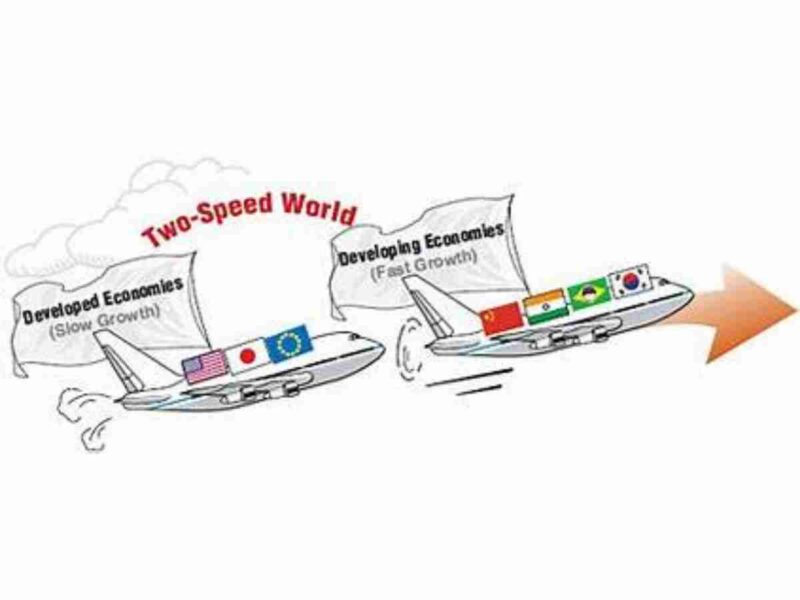Running a Two-Speed World
After the Great Recession of 2008 and the current Biden malaise, it has become clear that in its pursuit of Leftist ideology the first world has slowed its economy as it prepares to suicide.
This leads to the world having a two-speed economy where the developing world grows rapidly as the first world ages, which seems to have been the intent of the Utopians all along, since this way all nations will approximate a mean instead of having great variation between the strength of their economies:
By definition, two speed economies are economies whose industries experience unevenly distributed rates of growth.
Historically one of the best examples is England’s experience of the Industrial Revolution. During this period, newly established manufacturing to the North easily outpaced traditional agriculture found in the South.
Today the challenge is managing economic powerhouses, such as Brazil, China and India, whilst stabilising and improving economic conditions in Western Europe and the US. Currently developing nations are forecasted to grow at a rate of 6.2% for 2012, with high-income nations sitting at 2.2%.
At the time a few consultants advised the developed world to forgive any debts it held in the third world in order to let these states develop more quickly, but instead only a few selected debts were forgiven for political reasons.
Investments in the developing world grew somewhat but were motivated by a messianic moral outlook instead of practical economic policy. The main action taken after 2008 was the Reserve Banking’s stress-test to limit such outfall in future, but the world never returned to its 1990-2008 state.
This in turn caused the developing world to want to break free from its former Sugar Daddy, causing an outbreak of wishful thinking about a multipolar world:
Global inspiration & cooperation imploded over the last years. With the centrifugal force gone, everyone retreats to straightening their home. The affirmation of regional cultural & political powers is creating a multipolar world headed each by the US, EU, China, India & Russia.
The dragging 2008 recession by implication destroyed the world’s economic centrifugal force, upsetting not only economics, but geopolitics and even culture.
First, we show how the compositional approach reveals that the apparent convergence between the values of the USA and Japan is likely driven by different processes of cultural change. Second, we discuss China, India, and 12 other countries whose cultures changed little over several decades. Third, we identify the multiple trends in our results for the remaining 76 countries. As noted by Welzel, emancipation is the major trend, but the compositional approach reveals that it comes in at least two distinct forms, and also that many countries are evolving in opposing directions to these.
The above clearly identify the Western propensity towards the well-known change paradox, which is change causing more change, not less. But what has in fact changed for the West, which have led to a LOT more change, is its lack of children.
The baby shortfall has huge consequences beyond potentially filling the nation with immigrants. An aging population brings higher healthcare costs, budgets devoured by pensions, shrinking tax bases, labour shortages, empty schools and universities, and a stagnant economy.
It is beginning to look like there are two-speed people too. Intentionally ignoring the universal view on two-speed humans, within any nation there are sometimes a quite visible two speed effect. Typically, it would be between faster demand driven industry versus slower nature-controlled agriculture. But the future from 2023 henceforth has a little two-speed crinkle in it, which is that in future the world will be forced (again) to manage two-speeds, but this time it will be the physical vs the virtual worlds.
While the U.S. was in recession, PayPal, an ecommerce business, was growing at over 20 percent. Smartphones and slates have been the runaway success stories of 2010. Microsoft’s Kinect is taking the technology of user interfaces to a game changing level exceeding sales estimates. In this context, BCG’s assertion that there is “no alternative economic engine” should be viewed with caution.[v]
From this we can see the globalist structure: the first world manages marketing and accounting while the third world handles production and waste disposal.
Like most problems of developed countries, the first world faces the problem of making currency virtual like it has made reality virtual through peer pressure: it has distanced itself from reality.
In the meantime, the developing world is growing quickly thanks to first world investment by private entities — these do not generally forgive debts — and therefore will find itself dealing with a different beast than government.
We can see here the endgame of bourgeois “libertarian Leftism” as practiced in the West. In the name of human rights, it will take over the world, and then use freedom as its cover story for compelling people into financial and labor arrangements.
Not surprisingly, much of the third world narrative focuses on emancipation from this system, but because they have not recognized it as a two-speed economy, they are simply replicating it with local ownership and will be forced into the sucking vortex even faster.
Tags: developing world, economy, Globalism










